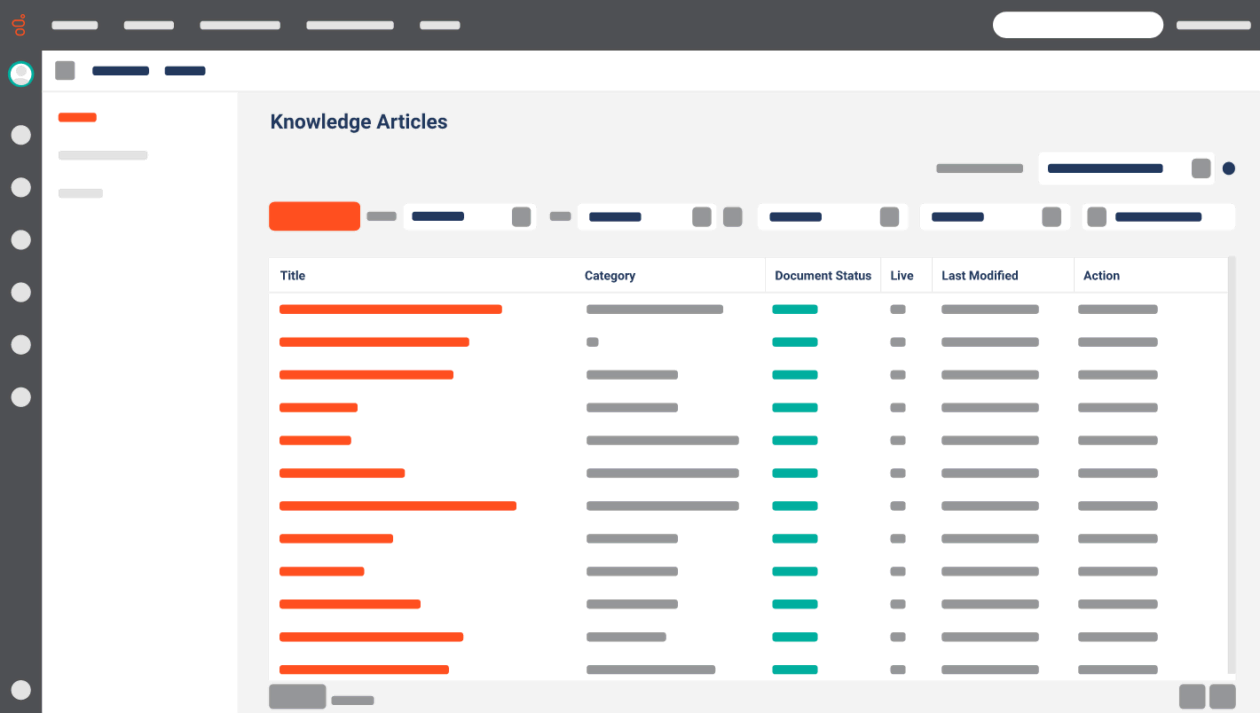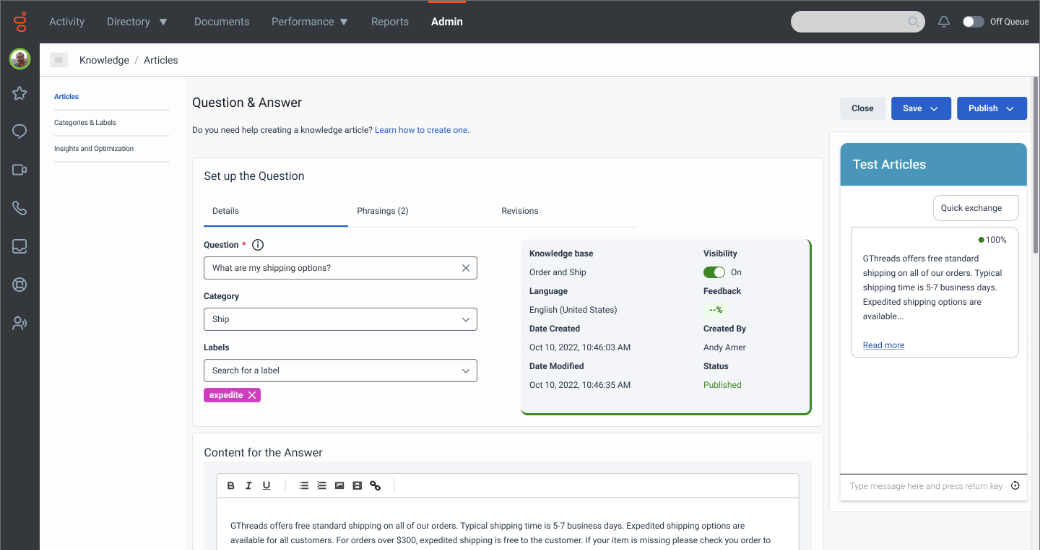
Make all types of knowledge easy to create, edit, maintain and activate for the various channels. This boosts productivity for your users.
Automatically deliver the right knowledge across channels. Using artificial intelligence (AI) ensures you base information on customer intent, not just keywords.
Know how often customers and agents use knowledge. Learn whether it’s effective and explore the differences in use across channels.

Curate, organise and deliver rich information with an intuitive knowledge workbench. Eliminate coding requirements and save time for your content authors. This gives them more time to manage knowledge and make it easy to discover.
Understand what your agents and customers are looking for with an AI-powered semantic search experience. It uses context to provide dynamic content in sync with customer journeys, allowing agents to build customer relationships.
Automatically surface knowledge with self-service tools, such as bots, agent assist and support centre. Help customers and agents resolve issues and inquiries faster. This lets them focus on knowledge needs that require a human touch.
Get automatic insights into knowledge use and effectiveness from various points of interaction. Identify knowledge gaps and easily address them in real time without holding back on customer interactions.
Deliver knowledge that feels personal, in-context and in the language your customers communicate. Easily add new and different ways for your customers to ask questions. And easily update how you handle them across specific channels.
Import and access knowledge that exists across files and shared resources. Connect to existing third-party tools and investments. When blended into your Genesys environment, they can deliver knowledge insights quickly.

78%
of respondents expect the greatest frustration for CX employees is having insufficient information to assist customers in the moment
Customer Experience and the Future of Work MIT Technology Review Insights, 2022
Businesses continually create new knowledge as products and services expand. Entering new markets and expanding your customer base also builds knowledge. But sharing the right knowledge with the right stakeholder — at the right moment — is challenging.
With Genesys, you have access to user-friendly knowledge management tools. These make it easy to deliver better agent and customer experiences. Eliminate silos across your organisation with collaboration tools that easily compile and access your content library, customer data and other helpful resources. Give your customers and agents the right information, in the right moment — improving every customer interaction.
Give your customers and agents the knowledge they crave with a centrally maintained knowledge base software used across touchpoints. Give every area of your organisation, including customer support and sales teams, access to the information they need. Include all users and information consumers in your feedback loop to train and improve self-service content across engagements.
Enable knowledge for customers and agents by building a single knowledge repository. This should support digital and voice-based interactions through self-service, bots or agent-led conversations. Provide a more consistent customer experience (CX) across touchpoints.
Give your knowledge workers easy-to-use tools to create and enrich knowledge. Create knowledge repositories or import your existing content sources. Genesys supports rich text, image and video to make content come alive. Organised knowledge ensures your content is easy to find and ready for use on your terms.
Enable information to flow automatically from the repository to any point of impact in real time. Semantic search and AI ensure that content is retrieved based on intent, not keyword, in the context of the interaction. Add channel dimensions to your repositories to ensure your knowledge base can support customer self-service as well as agent-led interactions with equal precision.
Easily create a smart portal for your knowledge repository. Activate specific knowledge categories or the entire knowledge base to use as a support centre for customers or employees. Add to your web page with a simple snippet of code that lets you incorporate smart search capabilities. This includes a type-ahead dropdown that makes it quick and easy to find the right information.
Customers and employees want information on their terms and in their language. Support their needs by offering knowledge in multiple languages. Today, we support English, German, French, Spanish, Italian and Portuguese — with more language support coming in the future.
Use interactive reports of knowledge usage and effectiveness to proactively close knowledge gaps and find opportunities for improvement. Knowledge Optimiser provides a view into requests for knowledge and shows which were successful and which weren’t. It also shows the most frequently used information and information considered best by those using it.
Knowledge management tools help organisations capture, organise and apply knowledge from multiple systems. These include document management systems, databases, intranets, search engines, collaboration platforms, AI-powered knowledge bases and learning management systems.
There are three key technologies used for knowledge management:
Knowledge management tools help companies of all sizes that share processes, practices, information and policies. This can be between departments or groups and functional roles.
Created, stored and shared knowledge as part of a comprehensive knowledge management program. A robust knowledge management solution lets creators contribute knowledge in multiple formats including text and images. There must be enough storage available to house in one place all the knowledge a company needs. It must also allow many ways of knowledge consumption, including different permission types and different consumption channels.
Best practice calls for an analysis of the current state of knowledge at your company. Ask yourself these questions:
Next, determine the ideal state of knowledge at your company. In almost all cases, the ideal state of knowledge sharing is a centralised system. Well controlled knowledge by administrators ensures completeness and accuracy.
If you’re focused on sharing information, knowledge management can support a variety of media types. Text, rich text, images, and video are all key features of an internal knowledge base capability set.
Centralised knowledge enables more effective use of it. All consumers of knowledge should look to a single knowledge base, regardless of how they consume knowledge. Having just one knowledge base that shares knowledge with all channels creates consistent and standard insights. All departments and lines of business benefit.
A centralised repository of knowledge gives you a number of advantages. It will:
AI can significantly enhance your knowledge management tools by introducing advanced capabilities such as answer automation and improved information retrieval. Knowledge management tools are designed to organise, store and retrieve information efficiently, but integrating AI takes this to the next level.
With AI-powered answer automation, these tools can automatically generate responses to common questions by pulling relevant information from a vast database of knowledge. This reduces the time employees spend searching for answers and ensures that they receive accurate and consistent information quickly. AI can identify patterns in queries and provide contextually relevant answers, improving both speed and accuracy.
Moreover, AI enhances the overall functionality of knowledge management tools by learning from user interactions. It can recommend related articles, documents or data based on previous searches, ensuring that users have access to the most relevant information. AI can also help in curating and updating the knowledge base, identifying outdated information and suggesting new content to keep the knowledge base current.
AI not only optimises the efficiency of knowledge management tools through answer automation but also ensures that the information provided is accurate, relevant and up-to-date, thereby enhancing the overall productivity of your organisation.
Knowledge management in call centres plays a crucial role in enhancing experience management by directly influencing the quality of customer interactions and overall satisfaction.
Effective knowledge management ensures that call centre agents have quick access to accurate and up-to-date information, enabling them to respond to customer inquiries efficiently and consistently. When agents can easily retrieve the right information, it reduces response times and increases the accuracy of the support provided, which directly impacts the customer experience.
By streamlining the flow of information, knowledge management minimises the chances of errors or inconsistencies during customer interactions, leading to a more seamless and positive experience. This, in turn, enhances experience management by ensuring that customer interactions are not only efficient but also leave a lasting positive impression.
Furthermore, knowledge management tools often incorporate feedback loops where information from customer interactions is fed back into the system. This allows the organisation to continuously update and refine its knowledge base, ensuring that future interactions are informed by past experiences. As a result, experience management benefits from this ongoing improvement process, leading to more personalised and effective customer service.
In summary, robust knowledge management in call centres significantly improves experience management by ensuring that agents are well-equipped to provide timely, accurate and personalised support to customers.